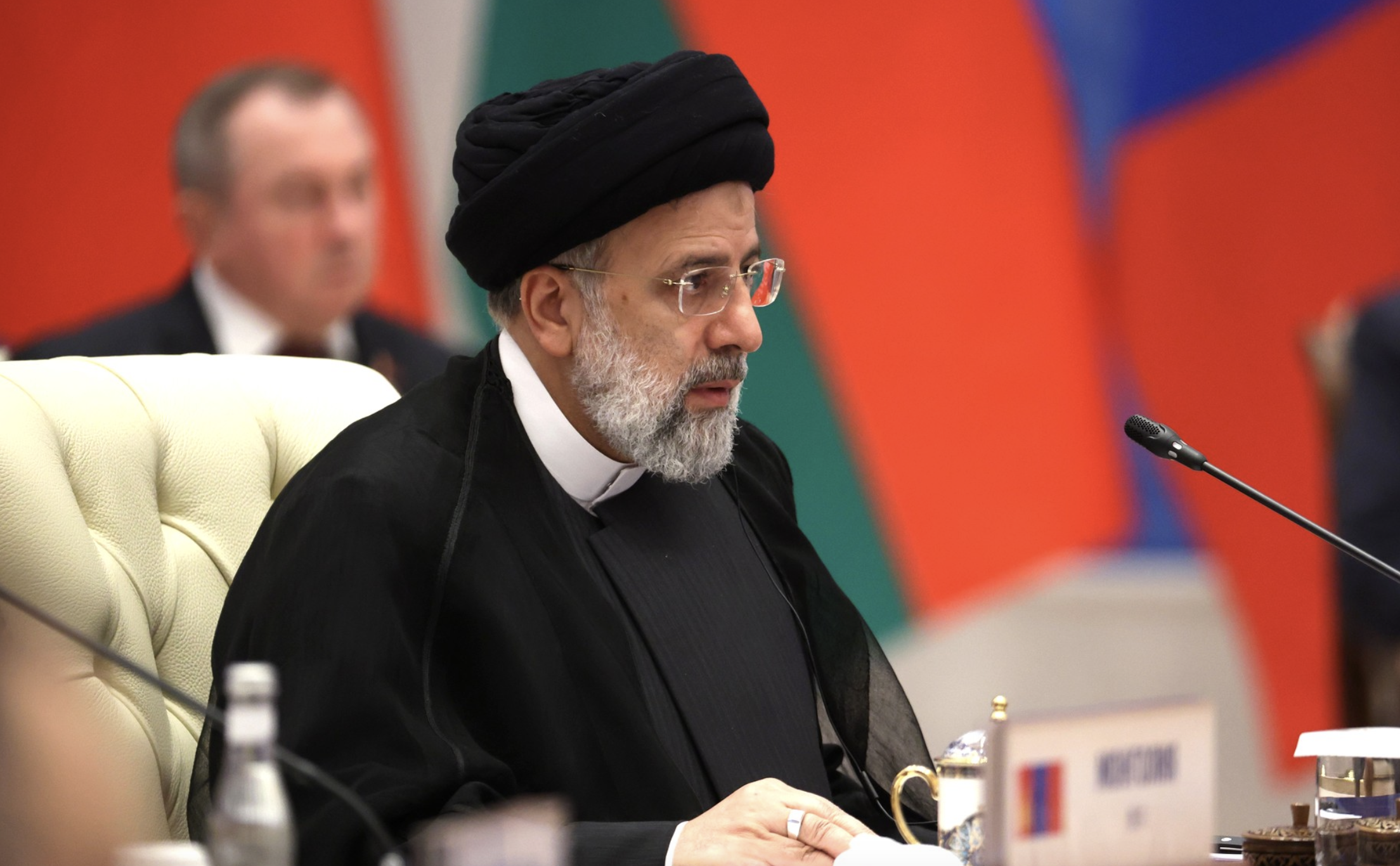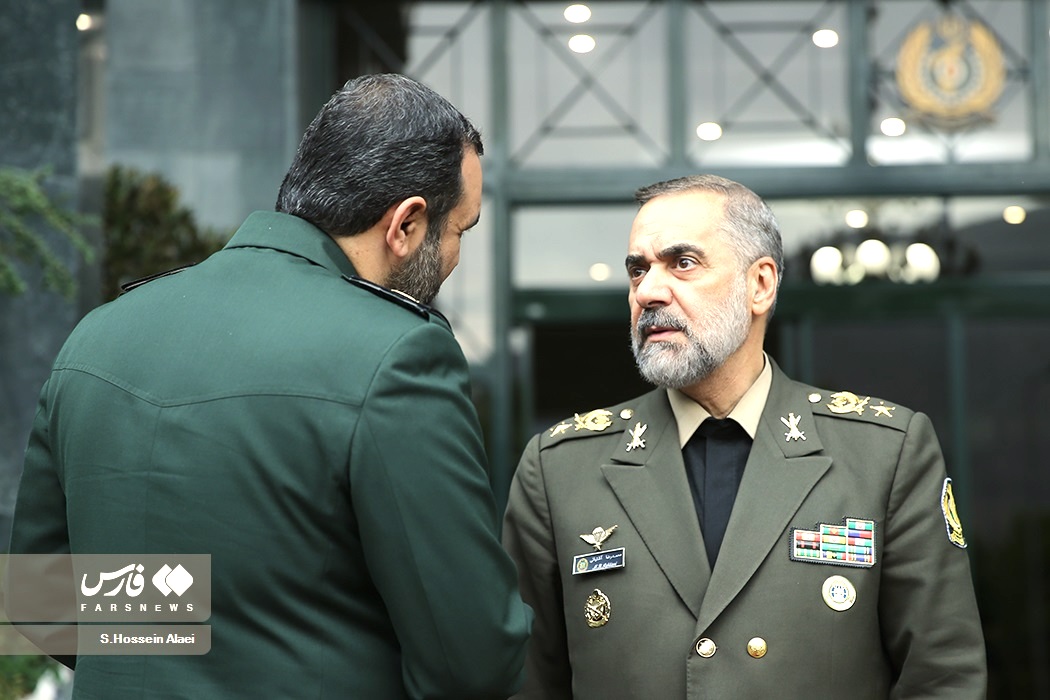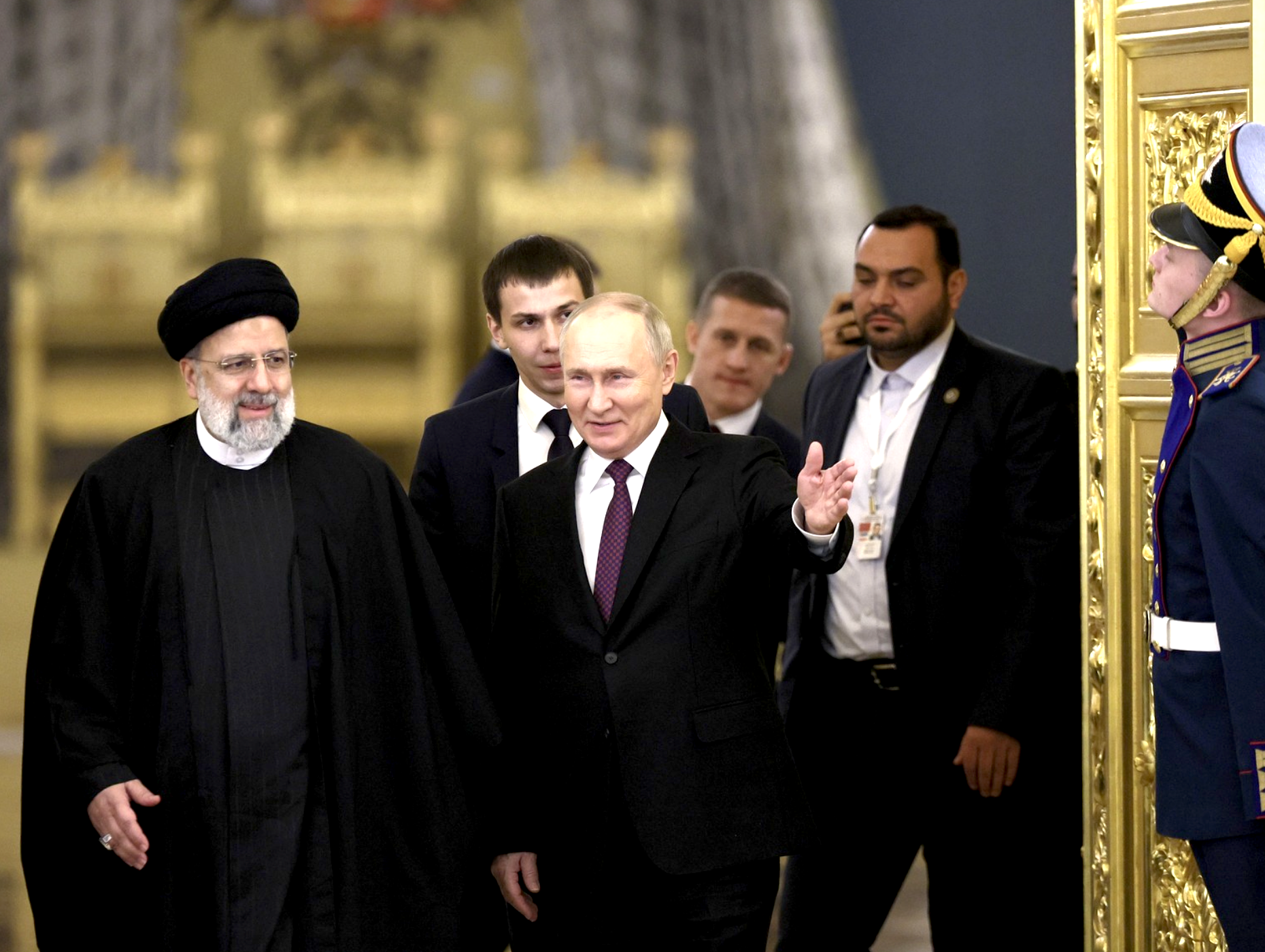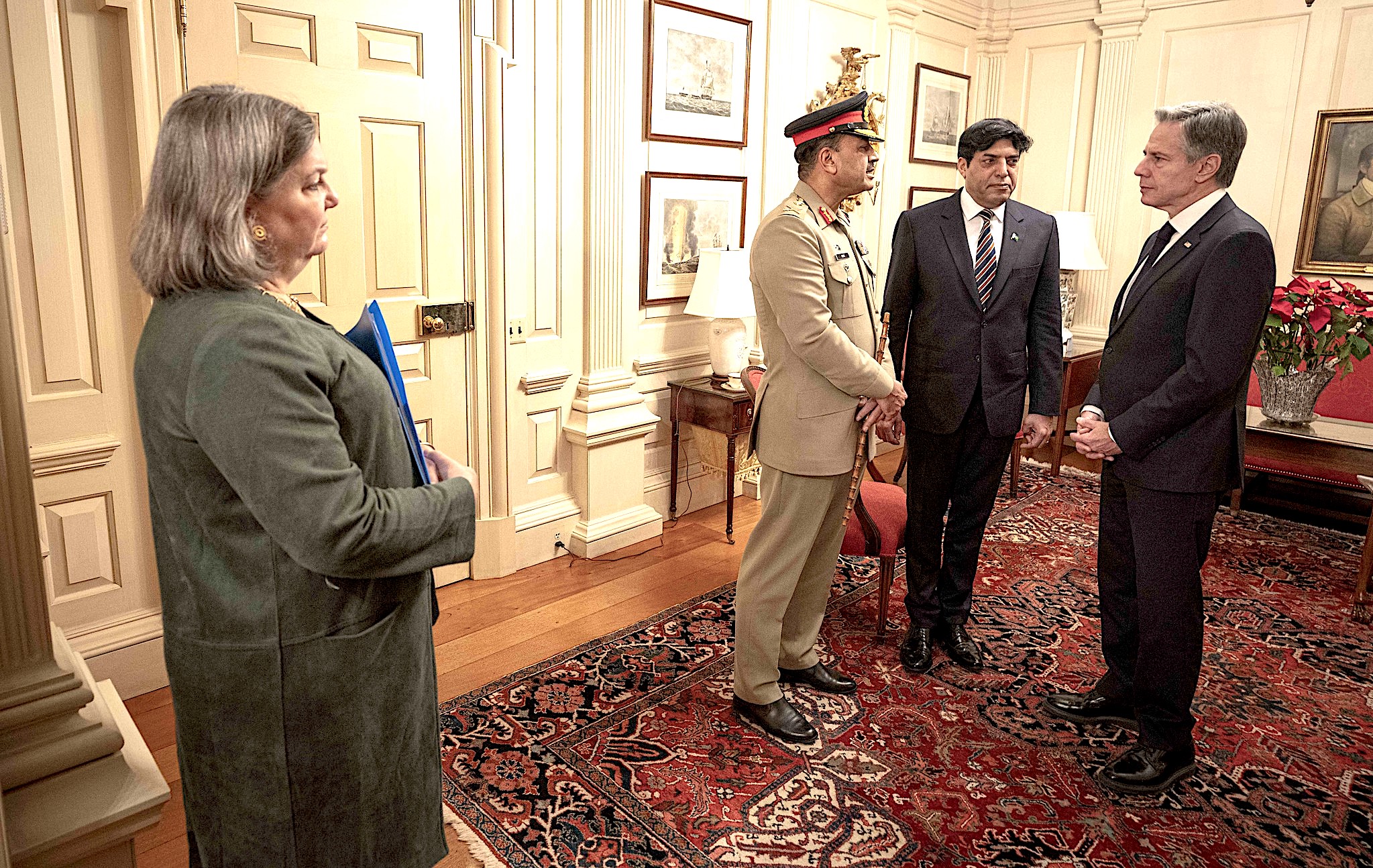Tehran just sent a big message about Washington’s stratagem of creating a coalition of terror groups in the region, writes M.K. Bhadrakumar.

Iran’s President Seyyed Raisi in Moscow in 2022 for a meeting of the Shanghai Cooperation Organisation. (TASS)
By M.K. Bhadrakumar
Indian Punchline
 After stunning missile and drone strikes on three countries — Syria, Iraq and Pakistan — over a period of 24 hours, Tehran then took the extraordinary step of claiming responsibility for the attacks.
After stunning missile and drone strikes on three countries — Syria, Iraq and Pakistan — over a period of 24 hours, Tehran then took the extraordinary step of claiming responsibility for the attacks.
This conveyed a very big message to Washington that its stratagem of creating a coalition of terror groups in the region surrounding Iran will be resolutely countered.
That the U.S. strategy against Iran was taking new forms began emerging after the Oct. 7 attack on Israel and the consequent erosion of its standing as the regional supremo.
The China-brokered Iran-Saudi rapprochement and the induction of Iran, Saudi Arabia, the U.A.E. and Egypt into BRICS put U.S. strategists in panic mode. (See my analysis “US embarks on proxy war against Iran,” on Nov. 20, 2023.)
There were already signs by the latter half of 2023 that the U.S.-Israeli axis was planning to use terrorism as the only viable means to weaken Iran and restore the regional balance in favour of Tel Aviv.
That is critically important for Washington’s prioritisation of the Asia-Pacific while it continues to need to control the oil-rich Middle East. Indeed, a conventional war with Iran is no longer feasible for the U.S., as it risks the potential destruction of Israel.
Future historians are sure to study, analyse and arrive at sober conclusions as regards the attacks on Israel by Palestinian resistance groups on Oct. 7.
In classic military doctrine, they were quintessentially a pre-emptive strike by resistance groups before the U.S.-Israeli juggernaut of terrorist groups — such as ISIS and Mujahideen-e-Khalq — turned into a rival platform matching the Axis of Resistance.

Iranians celebrate the Al Aqsa Flood attack by Hamas on Oct. 7, 2023. (Ahamadreza Madah, Wikimedia Commons, CC BY 4.0)
Tehran is cognisant of the urgent necessity to carve out strategic depth before the wolves close in. It has been pressing Moscow to expedite a bilateral strategic pact but Russians, unsurprisingly, took time over it.
One key agenda item during President Ebrahim Raisi’s “working visit” to Moscow on Dec. 7 to meet with President Vladimir Putin was finalising the pact.
On Monday, finally, the Russian Defence Ministry disclosed in a rare statement that Defence Minister Sergey Shoigu had called his Iranian counterpart Mohammad-Reza Ashtiani to convey that Moscow has agreed to sign the pact. The MoD statement stated:
“Both sides stressed their commitment to the fundamental principles of the Russian-Iranian relations, including unconditional respect for each other’s sovereignty and territorial integrity, which will be confirmed in the major intergovernmental treaty between Russia and Iran as this document is being finalised already.”

Iran’s Ashtiani, on right, in May 2023. (Fars Media Corporation, Wikimedia Commons, CC BY 4.0)
According to Iranian news agency IRNA, Shoigu conveyed that Russia’s commitment to Iran’s sovereignty and territorial integrity will be explicitly stated in the pact.
The report added that “the two ministers also pointed out the importance of issues related to regional security and emphasised that Moscow and Tehran will continue their joint efforts in establishing a multipolar world order and negating the unilateralism of the United States.” [Emphasis added.]
On Wednesday, Maria Zakharova, spokeswoman for the Russian Foreign Ministry, told reporters in Moscow that the new treaty would consolidate the strategic partnership between Russia and Iran and cover the full range of their ties. “This document is not just timely, but also overdue,” said Zakharova.
“Since the signing of the current treaty, the international context has changed and relations between the two countries are experiencing an unprecedented upswing,” she said. Zakharova added that the new treaty was expected to be signed during an upcoming contact between the two presidents.
Separately, Kremlin spokesman Dmitry Peskov was quoted by the TASS state news agency as saying that an exact date for a meeting between Putin and Raisi is to be determined. Clearly, something of profound significance to the geopolitics of the Middle East is happening in front of our eyes.
A New Milieu

Raisi with Putin in Moscow on Dec. 7, 2023. (Sergei Bobylev, TASS)
Iran’s missile and drone strikes against terrorist targets on Wednesday are a vivid demonstration of its assertiveness to act in self-defence in the new regional and international milieu.
Iran’s so-called proxies — be it Hezbollah or Houthis — have reached adulthood with a mind of their own, who decide their own strategic positioning within the Axis of Resistance. They don’t require a life-support system from Tehran.
It may take some time for the Anglo-Saxon strategists to get used to this new reality, but eventually they will.
Clearly, it is an underestimation to regard Iran’s missile and drone strikes as merely counter-terrorist operations. Even with regard to the strike on Baluchistan, interestingly, it took place within a month of the weeklong trip to Washington in mid-December by Pakistan’s chief of army staff, Gen. Asim Munir.
Munir met senior U.S. officials, including Secretary of State Antony Blinken, Secretary of Defense Lloyd Austin, U.S. Forces Chairman of Joint Chiefs of Staff Gen. Charles Q. Brown and U.S. Deputy National Security Adviser Jonathan Finer — and, of course — the redoubtable Acting Deputy Secretary of State Victoria Nuland, the driving force behind the Biden administration’s neocon policies.

From left: Nuland, Munir and, on right, Blinken at the State Department in Washington on Dec. 14, 2023. (State Department, Freddie Everett)
An official statement in Islamabad Dec. 15 on Munir’s high-flying tour stated that Pakistan and the U.S. “intend to increase interactions” for “mutually beneficial” engagements. It said the two sides discussed the ongoing conflicts in the region and “agreed to increase interactions between Islamabad and Washington.”
The statement said,
“Matters of bilateral interests, global and regional security issues, and ongoing conflicts were discussed during the meetings. Both sides agreed to continue engagement for exploring potential avenues of bilateral collaboration in pursuit of shared interests.”
The statement added that during the meeting between the top defence officials of the two countries, “counter-terrorism cooperation and defence collaboration were identified as core areas of cooperation.”
On his part, Munir underscored the importance of “understanding each other’s perspectives” on regional security issues and developments affecting strategic stability in South Asia, according to the Pakistani statement.
Pakistan [which launched retaliatory strikes on Iran on Thursday] has an entire history of serving American interests in the region and the General Headquarters of the Pakistan Army in Rawalpindi has been the charioteer of such collaboration.
We only targeted Iranian terrorist group on the soil of Pakistan. We respect sovereignty & territorial integrity of Pakistan but we dont allow national security to be compromised or played with, says Iran Foreign Minister Hossein Amir-Abdollahian at Dovas on Iran strikes in Pak pic.twitter.com/akdZIiR4XO
— Sidhant Sibal (@sidhant) January 17, 2024
What is evident today is that the forthcoming elections in Pakistan did not discourage the Biden administration from rolling out the red carpet for Munir. But the good part is that both Iran and Pakistan are smart enough to know each other’s red lines.
U.S. intentions are clear: outflank Tehran in the west and east with failing states that are easy to manipulate. The hastily arranged meetings in Davos between U.S. National Security Advisor Jake Sullivan and top Iraq officials (here and here) in the downstream of the Iranian strikes underscored
- “the importance of (Kurdistan) resuming oil exports (to Israel) and Washington’s support for “the Kurdistan region’s strong partnership with the United States;”
- the importance of stopping attacks against U.S. personnel in Iraq and Syria;
- U.S. commitment to “enhancing security cooperation as part of a long-term, sustainable defence partnership;”
- U.S. support for Iraqi sovereignty; and,
- Biden’s invitation for Iraqi Prime Minister Mohammed Shyaa Sudani to visit the White House “soon.”
In a nutshell, Sullivan has voiced the U.S. intention to strengthen its presence in Iraq — and it has similar objectives to pursue in Pakistan too. Washington trusts Munir to ensure that Imran Khan languishes in jail no matter the outcome of the Pakistani elections.
[See: US Urged Ouster of Khan, Cable Shows]
This strategic realignment comes at a time when Afghanistan has conclusively slipped out of the Anglo-American orbit and Saudi Arabia shows no interest in being a cog in Washington’s wheel or dabbling with forces of extremism and terrorism.
M.K. Bhadrakumar is a former diplomat. He was India’s ambassador to Uzbekistan and Turkey. Views are personal.
This article originally appeared on Indian Punchline.
The views expressed are solely those of the author and may or may not reflect those of Consortium News.

Seems like a pretty simple code …. I’m reminded of Country Joe’s famous Woodstock cheer …. “Gimme a F …. Gimme a U …. …. What’s that spell? What’s that spell?”
At this point, the list of nations is growing that give that cheer to the good ol USA and its bombs and missiles and economic wars and torture camps. That’s the message that America and its minions like Israel are receiving, and on my set its coming in 5 by 5. “gimme a F …. gimme a U …”
Hey America, what’s that spell? The rest of the world has a suggestion for what you can go do to yourselves. The message from the world is coming in loud and clear. They tried asking nicely. Now they’ve heard Al Capone explain how America really works. That’s the message. Karma sucks.
Blinken and Nuland —in the same room, with the same hypocrisy and the same lack of humanity.
“U.S. support for Iraqi sovereignty;” US hypocrisy reaches new level having been asked to leave Iraq years ago. The whole world is wise to this bullshit but they keep on trying.
“In a nutshell, Sullivan has voiced the U.S. intention to strengthen their presence in Iraq…..” It wasn’t that long ago having the US presence in Iraq meant Abu Ghraib, constant bombing, the kidnappings of innocent Iraqis to fly off to black cells to be tortured.
There has been virtually no or very little discussion of the neo-cons takeover to the US DOS. This article’s picture of Nuland and Blin ken conducting highest level talks with Pakistan dramatically depicts this current reality!
The throes of an empire in irrevocable decline — a decline due almost entirely to its own actions. The United States responded to 9/11 by lashing out militarily in Libya, Syria, Iraq and Afghanistan, inflicting war crimes and killing hundreds of thousands of innocent civilians. A markedly weaker geostrategic position and a catastrophic lowering of our international esteem is all we have to show for it. The consequences resonate far beyond the Middle East and are shaking our and the West’s world primacy to its very foundations. The world has stopped listening to us. The non-Western world is lining up to join BRICS and the Shanghai Cooperation Organization and to replace the dollar as the main international currency. They are largely ignoring our calls to sanction Russia over the Ukraine. Why? Because they are increasingly seeing the United States not as the solution, but as the problem.
At the end of World War II, America was at the forefront of creating international institutions of diplomacy and rule of law to peacefully resolve differences among nations. Our international prestige was never higher. Today, we have largely abandoned those institutions and conduct our “diplomacy” primarily through NATO and, apparently, a ring of terror organizations we think we control. It is hardly coincidental that our influence and moral authority is today the lowest it has been in 75 years and declining at an ever-accelerating rate.
A rare perspective and most informative. Here’s to more “decoding.”
Imran Khan, democratically elected and a hero of Pakistan, should not be in jail for opposing US hegemony in his own country. I’m increasingly sick of American duplicity in desperately shoring up its version of its world order. The genocide in Gaze clearly unmasks the US, UK and Israel for the wolves they are.
How does Iraq’s recent get out of Dodge direction to the US play into what you just said?
Last Thursday at Davos. Sudani wants “an immediate pullout of the US-led foreign forces.”
hxxps://www.tehrantimes.com/news/493879/PM-Sudani-seeking-quick-pullout-of-US-forces-from-Iraq
Sudani is dealing with a tricky mix of factors, including enmity of Moqtada and the Sadrists, Iran militia-oriented forces, and economic problems in dealing with the US.
This piece also has good background on Iraq’s problems:
hxxps://www.middleeasteye.net/news/playground-choice-iran-organizes-drive-us-troops-out-iraq
beware of MEE, their reports have a tendency for UK, US bias. the Iraqi publication Al Shafaq, in English, gives a better perspective (although close reading’s still required) – hxxps://www.shafaq.com/en/Report/Iraq-A-favored-battleground-for-Tehran-and-Washington
Its meaningless noise to be ignored like “U.S. support for Iraqi sovereignty” America does what it chooses in Iraq
Omission: Victoria Nudelmann’s last name was omitted above. Sorry, “Nuland”.